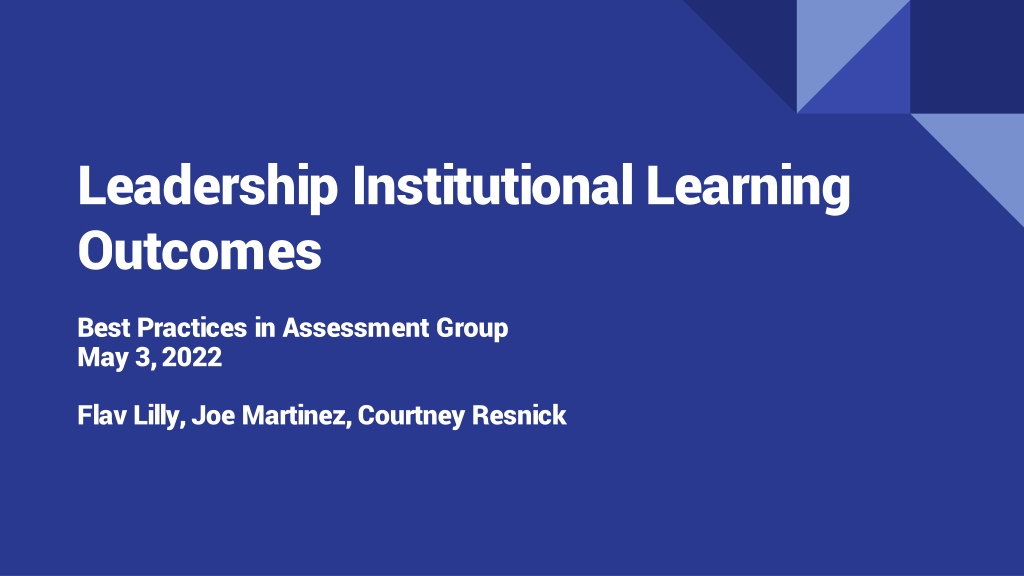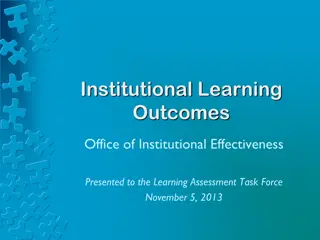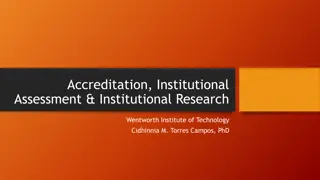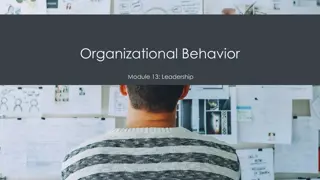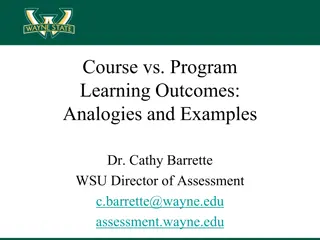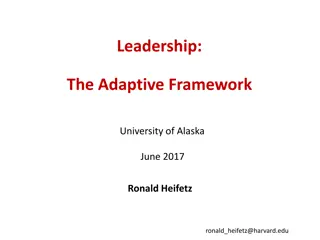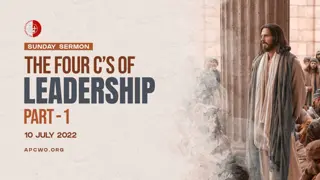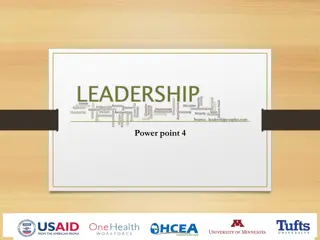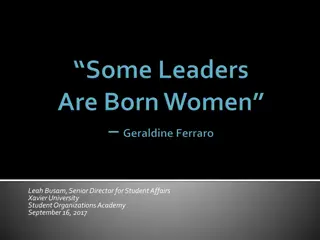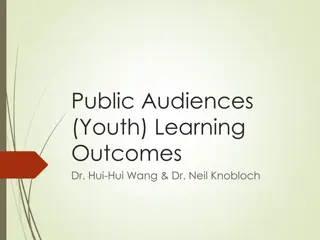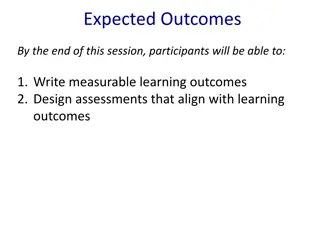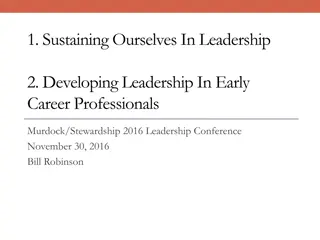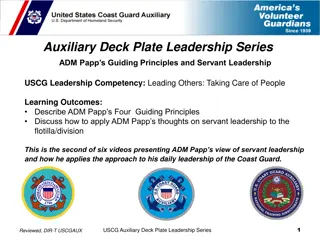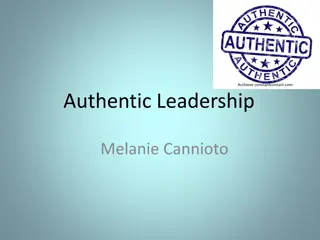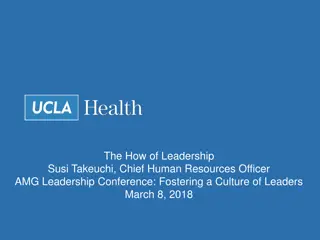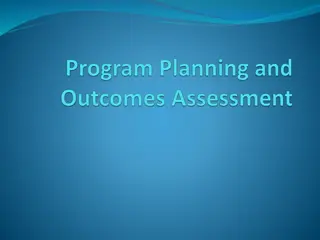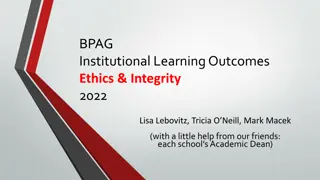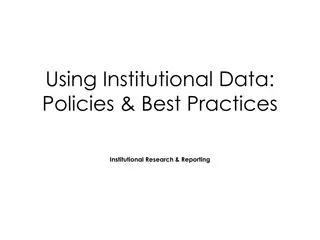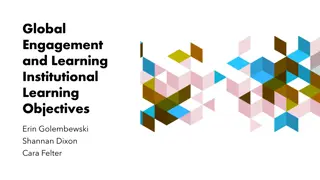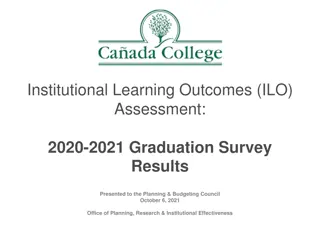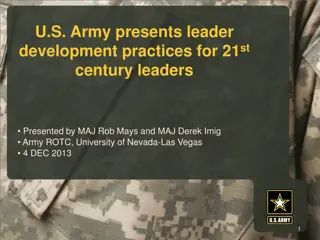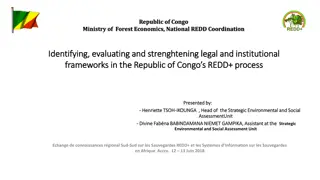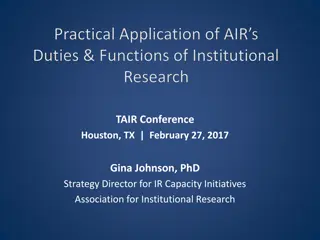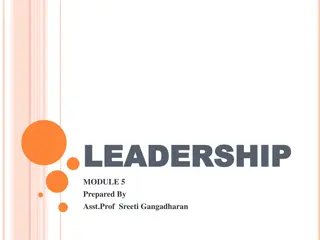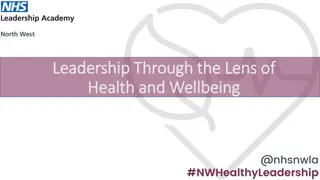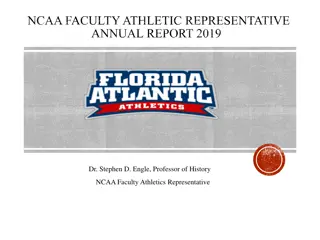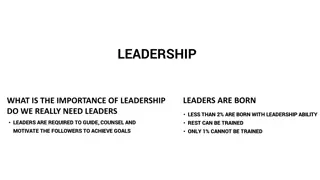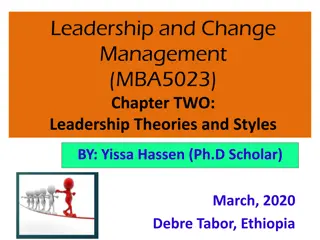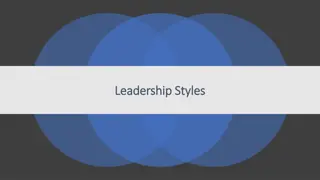Leadership Institutional Learning Outcomes and Best Practices
The content discusses the leadership institutional learning outcomes focusing on critical thinking, empathy, inclusivity, adaptability, and courage. It delves into the definition of leadership, emphasizing its influence on behavior towards common goals. The learning outcomes at the University of Maryland, Baltimore, highlight teamwork, critical thinking, and self-evaluation. The connection between teamwork and leadership is explored, emphasizing the importance of collaborative efforts in achieving objectives.
Download Presentation

Please find below an Image/Link to download the presentation.
The content on the website is provided AS IS for your information and personal use only. It may not be sold, licensed, or shared on other websites without obtaining consent from the author. Download presentation by click this link. If you encounter any issues during the download, it is possible that the publisher has removed the file from their server.
E N D
Presentation Transcript
Leadership Institutional Learning Outcomes Best Practices in Assessment Group May 3, 2022 Flav Lilly, Joe Martinez, Courtney Resnick
Leadership ILO Workgroup Thank you to the following individuals who served on the workgroup: Gerald Kayingo (Graduate School) Greg Brightbill (Student Leadership and Involvement) Norman Retener (School of Medicine) Kyla Liggett-Creel (School of Social Work) Maeve Howett (School of Nursing) Andy Coop (School of Pharmacy) Kate Noonan (School of Dentistry)
Leadership Institutional Learning Outcome Statement Graduates of the University of Maryland, Baltimore will use critical thinking skills guided by evidence to be empathetic, inclusive, adaptable, and courageous leaders in their profession.
Leadership Definition Leadership is a process in which individuals are influenced to behave in a certain way, usually toward a common goal or understanding. Leadership sets the direction and tone for organizations and can serve to motivate, create change, and challenge embedded practices that have historically impacted marginalized groups. Leadership requires students to evaluate their own values, biases, privileges, strengths, and weaknesses, therefore gaining a greater understanding of their role and responsibility in influencing organizational and systemic change. As a philosophy, leadership challenges students to apply critical thinking skills to an ever-changing environment, allowing them to see a greater connection between their profession and the University's mission of improving the human condition and serving the public good.
Learning Outcomes Upon Graduation from the University of Maryland, Baltimore, students will: 1. Have experience working as part of a team to achieve a common goal. 2. Have experience setting collective goals to advance a mission or objective. 3. Use critical thinking skills within their chosen profession by engaging in evidence- based practice and using ethical problem-solving skills to achieve positive results. 4. Evaluate their own values, biases, privileges, strengths, and weaknesses, in order to gain a greater understanding of their role and responsibility in influencing organizational change.
Objective 1 Students will have experience working as part of a team to achieve a common goal. Connection to Leadership Definition: Leadership is a process in which individuals are influenced to behave in a certain way, usually toward a common goal or understanding. Why is this important? Typically, leaders don t work independently; they have to be work as part of a group or groups to achieve goals. Being a productive team member requires communication, empathy, and adaptability and the ability to listen to others and incorporate collective feedback into decision-making.
Objective 2 UMB graduates will have experience setting collective goals to advance a mission or objective. Connection to Leadership Definition: Leadership is a process in which individuals are influenced to behave in a certain way, usually toward a common goal or understanding. Leadership sets the direction and tone for organizations and can serve to motivate, create change, and challenge embedded practices that have historically impacted marginalized groups. Why is this important? Leaders are responsible for advancing an organization s mission, which typically happens through setting and achieving goals. Having the experience of setting goals, either through practical experience or coursework will advance the leadership skills of our graduates.
Objective 3 Students will use critical thinking skills within their chosen profession by engaging in evidence-based practice and using ethical problem-solving skills to achieve positive results. Connection to Leadership Definition: Leadership is a process in which individuals are influenced to behave in a certain way, usually toward a common goal or understanding. Leadership sets the direction and tone for organizations and can serve to motivate, create change, and challenge embedded practices that have historically impacted marginalized groups. Why is this important? In all of the professions our students enter, they will need to take the knowledge they ve learned and apply it to unique situations. They will also need to rely on science and evidence to solve new and unique problems in their workplaces.
Objective 4 Students will evaluate their own values, biases, privileges, strengths, and weaknesses, in order to gain a greater understanding of their role and responsibility in influencing organizational change. Connection to Leadership Definition: Leadership requires students to evaluate their own values, biases, privileges, strengths, and weaknesses, therefore gaining a greater understanding of their role and responsibility in influencing organizational and systemic change. Why is this important? As we gain a deeper understanding of how organizations, healthcare, and the law can serve to strengthen or marginalize different groups, it s important for leaders to have a strong sense of who they are when leading and their role in influencing change.
Challenges Overlap with other ILO focus areas, especially with Cultural Competency, Ethics & Integrity, and Community Engagement. Broad construct that isn t easily defined and may mean different things to different individuals and/or professions.
